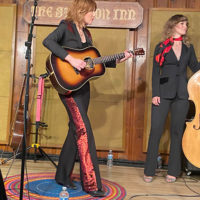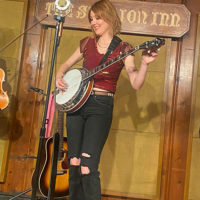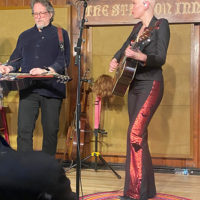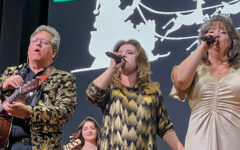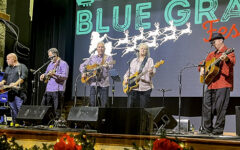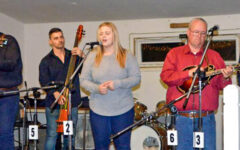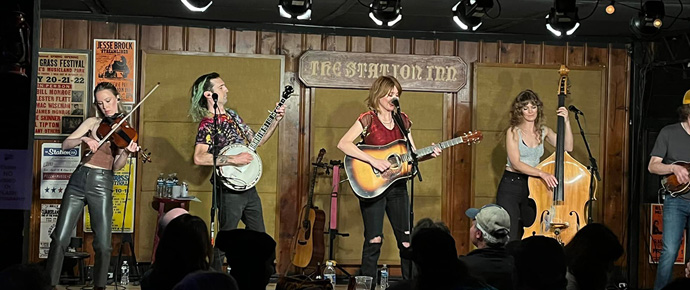
Molly Tuttle & Golden Highway at the Station Inn (3/28/22) – photo by Wayne Slaven
Monday night’s album release show at the Station Inn for Molly Tuttle’s new Crooked Tree is one that gave me hope for a revitalized industry that welcomes fresh, compelling narratives. Tuttle’s blistering picking combined with everything her songs represent gave me the distinct impression I’ll someday find myself saying, “Oh I was there — I saw her back in 2022! And at the Station Inn!” in the same way people do about Pete Seeger, Woody Guthrie, and so many other influential Americana and bluegrass performers who played historic venues.
Molly’s new band, Golden Highway, came out wearing matching dark, jewel-toned and sequined suits that included a dash of leopard print and long, green hair for banjo player Kyle Tuttle. (In a previous interview I conducted with Tuttle for the Nashville Scene, she said the pair are keeping the reason for their shared last name a mystery.) Fiddler Bronwyn Keith‐Hynes of Mile Twelve fame joined Dominick Leslie on mandolin and Shelby Means on bass. The group has their finger on the pulse of modern fashion; a video of the band’s outfits posted to Tuttle’s Tik Tok account would kill.
Halfway through the first set, Tuttle played Crooked Tree, the titular track from the April 1 release that represents a marked return back to more traditional bluegrass style of songwriting and guitar picking after her last two albums, which explored rock, indie, and Americana heavily. The song features lyrics like “Can’t you see? / A crooked tree / won’t fit into the mill machine / They’re left to grow / wild and free/ I’d rather be a crooked tree.”
The message reminds us in an anxious moment that we’re all only human. Just before that number, Tuttle pulled off her wig to uproarious applause as she explained she lost her hair at age three because of an autoimmune disease called alopecia. She alluded to the news that just days ago, actor Will Smith slapped comedian Chris Rock on stage at the Oscars because Rock joked about Smith’s wife’s struggle with alopecia. Tuttle didn’t name names or dwell on the drama. She flashed a huge smile, cracked a joke, and continued to melt everyone’s faces with stunning guitar solos, a timely reminder that wholesome representation makes everyone’s day better.
Tuttle played two sets. The first was, essentially, the album in recorded order minus the title track and Big Backyard, the Guthrie-inspired tune about acceptance and togetherness written with Ketch Secor of Old Crow Medicine Show—Tuttle saved that one for the encore. Folks have already compared it to This Land is Your Land, and with lyrics like, “Come on out to the big backyard / it ain’t mine it ain’t yours / it’s all of ours,” it’s hard to argue with them. Tuttle sings about acceptance, being yourself despite challenges and of not being afraid to take necessary journeys to better yourself. Those narratives resonate with new audiences and in our last interview, Tuttle said she’s grateful to bring non-bluegrass fans into the fold by offering her own take on the genre. Being a board member of Bluegrass Pride and an LGBTQ+ writer and picker, I appreciated Tuttle’s mention of several Bluegrass Pride artists and her support for the organization.
Nobody can say the modern approach doesn’t sell, because numbers don’t lie. It felt like nearly a quarter-mile line stood outside the Inn on Monday night trying to get in, despite multiple paper plates declaring, “REALLY, SOLD OUT, DON’T ASK,” taped to the door. Her merch table was busy all night and the new record boasts collabs with Americana and folk stars like Gillian Welch, Secor and Margot Price, as well as mandolin player Sierra Hull. Tuttle’s undeniable popularity with so many different kinds of listeners gives me, a transgender reporter invited to a sold out show, hope that bluegrass of the future will continue to be ever more inclusive and compassionate.
The Station Inn is frequented by college students from nearby Vanderbilt University, and very often exchange students from other countries sit in the crowd. It’s possible a student’s only impression of the South, Appalachia, and bluegrass music was Tuttle’s show. If so, the wig-tossing, headbanging bluegrass guitar picker who embraces so many marginalized communities did us all proud.
Photos below from Jayne Tuttle Cooper.

